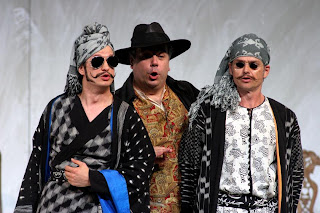Così fan tutte is an opera by the Austria-wide famous composer Mozart. It has such a smutty sujet that even in the German-speaking realm it is sung in Italian:
An older, experienced man initiates a wager with two youngsters that their fiancées, like all women, are ever susceptible to seduction by others. The bet is on.
Both gentlemen part, claiming duty calls them off to war. Five minutes later they return with glued-on mustachios as foreigners and start harassing the ladies to the utmost. I hate to divulge such indiscretions, but before the opera is over, both have succeeded in conquering the respective other's lass.
No surprise then, that Beethoven said that he'd not have been inspired to a single note by such sleaze. Today we see things differently. The girls admirably prove our society's increased inclination to better integrate foreigners.
(adopted from Vicco von Bülo)
 Dieter Dorn's direction of Così fan tutte has aged extraordinarily well, which is to say: not at all. The second performance of the (annual) Munich Opera Festival was greatly helped by a production that the Staatsoper rightly considers a gem in their repertoire. This is particularly so, since Così is an opera likely to please more through its music than subject or drama. (It is my favorite Mozart opera to listen to, but never has been my favorite opera to watch.) Perhaps that is why it has long been considered the ugly duckling of the three "Da Ponte Operas" of Mozart. Far from the novel treatment of well developed characters and drama that marks Don Giovanni and Le Nozze di Figaro with their psychological depth, Così is dramatically flat, more of an Opera Seria, presented as an (im)morality play where the structure, not the personality of its agents, determines the outcome. The music relates to all this, but seemingly as separate commentary... independently beautiful and ever so often consciously old fashioned. The chorus scenes offer the most jarring example: Unmotivated, superfluous appearances out of nowhere are justified merely by the glorious music they contribute.
Dieter Dorn's direction of Così fan tutte has aged extraordinarily well, which is to say: not at all. The second performance of the (annual) Munich Opera Festival was greatly helped by a production that the Staatsoper rightly considers a gem in their repertoire. This is particularly so, since Così is an opera likely to please more through its music than subject or drama. (It is my favorite Mozart opera to listen to, but never has been my favorite opera to watch.) Perhaps that is why it has long been considered the ugly duckling of the three "Da Ponte Operas" of Mozart. Far from the novel treatment of well developed characters and drama that marks Don Giovanni and Le Nozze di Figaro with their psychological depth, Così is dramatically flat, more of an Opera Seria, presented as an (im)morality play where the structure, not the personality of its agents, determines the outcome. The music relates to all this, but seemingly as separate commentary... independently beautiful and ever so often consciously old fashioned. The chorus scenes offer the most jarring example: Unmotivated, superfluous appearances out of nowhere are justified merely by the glorious music they contribute. Dorn, thankfully, does not ham Così up. He presents a harsh commentary on on Alfonso's wager that Fiordiligi and Dorabella are as fickle as allegedly all women are. Donna è mobile, indeed. The clean stage, made more intimate by three receding frames that accentuate the depth of the National Theater's stage, is carefully accentuated with a few chairs and various decorations that indicate a pleasant summer-villa somewhere in Italy - neither entirely abstract nor too literal. And when Nikolay Borchev and Rainer Trost (Guglielmo and Ferrando, respectively) appear as Albanians,they are indeed impossible to recognize with their silly turbans, sunglasses, and vaguely oriental getup.
Dorn, thankfully, does not ham Così up. He presents a harsh commentary on on Alfonso's wager that Fiordiligi and Dorabella are as fickle as allegedly all women are. Donna è mobile, indeed. The clean stage, made more intimate by three receding frames that accentuate the depth of the National Theater's stage, is carefully accentuated with a few chairs and various decorations that indicate a pleasant summer-villa somewhere in Italy - neither entirely abstract nor too literal. And when Nikolay Borchev and Rainer Trost (Guglielmo and Ferrando, respectively) appear as Albanians,they are indeed impossible to recognize with their silly turbans, sunglasses, and vaguely oriental getup.W.A. Mozart, Così fan tutte, R.Jacobs, Bernada Fink, Veronique Gens et al. |
For those who wish to discover Così sounding its very best I enthusiastically recommend René Jacobs' recording for Harmonia Mundi; a modern day classic I count among the very finest Mozart recordings I have ever had the pleasure to listen to.



All pictures by Wilfried Hösl, courtesy Staastoper München.
No comments:
Post a Comment